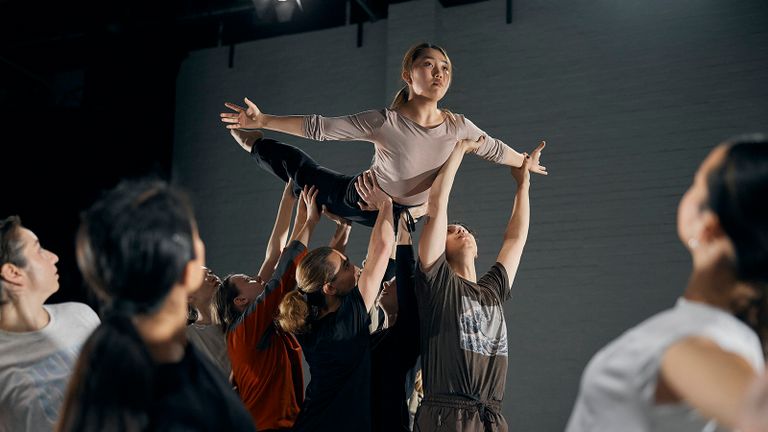Renowned for its close-knit atmosphere, this small West Sussex university folds seaside charm and countryside comforts into the academic timetable. A former teacher training college, Chichester became a university in 2005 and has an industry-led curriculum on its two campuses — one in the historic cathedral city and another by the sea at Bognor Regis.
Teacher training remains an established strength and was rated outstanding by Ofsted in May 2023, with inspectors reporting that trainees “value the nurturing family ethos”. The university is also known for its performing arts, social sciences and sports provision.
What is the University of Chichester’s reputation?
Overall, the university holds a gold rating in the Teaching Excellence Framework (TEF 2023), up from silver in TEF 2017. It was awarded gold for student experience, and silver for student outcomes. The panel noted “the genuinely innovative and flourishing industry partnerships embedded into a multitude of courses”.
Student satisfaction has rallied considerably in our analysis of the latest National Student Survey. Chichester has climbed 16 places to rank 12th for satisfaction with teaching quality and 20 places for the wider experience (87=).
Chichester gained the power to award research degrees in 2014. Nearly twice as many of its academic staff contributed to the latest Research Excellence Framework (REF 2021) as in the previous national assessment in 2014. Its submissions in sport, history, and English and creative writing produced the best results but against stronger performances elsewhere Chichester fell 32 places in our research quality index, where it now ranks 113th.
What degree courses have been discontinued and what new courses are available?
There are four additions in September 2025: biomedical science; children’s health and wellbeing; law with business; and psychology of esports. From 2026 a degree in speech and language therapy will join the curriculum.
The university has a growing portfolio of degree apprenticeships with 500 students enrolled on programmes including accounting finance; digital technology solutions; and data science.
What are the University of Chichester’s entry requirements — and my chances of getting in?
Courses demand grades from ABB to CCC with 11 per cent of the intake enrolling through clearing in 2024. A contextual admissions policy has been introduced reducing requirements by 16 Ucas points (two A-level grades) to applicants from disadvantaged backgrounds and benefited a fifth of applicants in its first year.
What are the graduate prospects?
The university ranks 70= in our analysis of the Graduate Outcomes survey, which tracks the number of students in highly skilled jobs or postgraduate study 15 months after earning their degree.
Chichester’s degree apprenticeship programme draws on the expertise of businesses such as the energy supplier SSE and Rolls-Royce, and most of Chichester’s degree programmes provide work placements.
What is the University of Chichester campus like?
The Chichester campus — Bishop Otter — is named after William Otter, the Bishop of Chichester and a passionate educationist in whose memory the original college was founded in 1839. It includes a music block and the School of Nursing and Allied Health, which was established in 2013 and run by University Hospitals Sussex NHS Foundation Trust, next to St Richard’s Hospital. Students have access to mock wards and simulation suites to develop their clinical skills.
Specialist facilities include the university’s Sport Performance and Rehabilitation Unit (SPRU) and an environmental climate chamber to simulate extreme heat, cold and altitude.
The Bognor Regis campus, linked to the city site by a bus service, has a new community diagnostic centre as well as the flagship Tech Park. The £35 million centre brings together science, technology, engineering, arts and maths courses and has input from more than 40 businesses including Rolls-Royce and Sony.
When can I visit?
chi.ac.uk
Everything you need to know about the University of Chichester’s student life and wellbeing support
The student-led Sports Federation not only fields competitive teams but organises more than 25 clubs for those who are in it for fun and fitness. Facilities include indoor and outdoor climbing walls, a running track, rugby pitch and a three-court sports dome. The sports hall has four courts and students can also use Astro pitches, a fitness suite and a multi-use games area.
Services provided by wellbeing, mental health and disability support teams include short-term counselling, access to specialists in neurodiversity and specific learning difficulties. There are staff-led peer support groups for those with ADHD and autism spectrum conditions.
What do the students say?
“There is so much support available, whether it is late nights in the library before a deadline, or help with careers, you have access to it all. The campus is not as overwhelming as other universities, and has a friendly community feel. It’s very inclusive of everyone, it prides itself on this and it shows!”
Emily, BSc adult nursing
What about student accommodation in the University of Chichester?
Halls of residence are found at both campuses and a third of the accommodation places are catered. First-years are guaranteed a room if they apply in time.
How diverse and inclusive is the University of Chichester?
Chichester has fallen 35 places year-on-year in our social inclusion index (94th). Disabled recruitment has almost tripled to 29 per cent, however, putting the university in the top 10. Outreach work focuses on target schools with high proportions of pupils less likely to progress to university.
Everything you need to know about scholarships and bursaries at the University of Chichester
The university awards £1,000 over three years to students who previously received free school meals. A £400 gifted athlete programme provides performance analysis, psychology, nutrition and physiotherapy, and kit.
